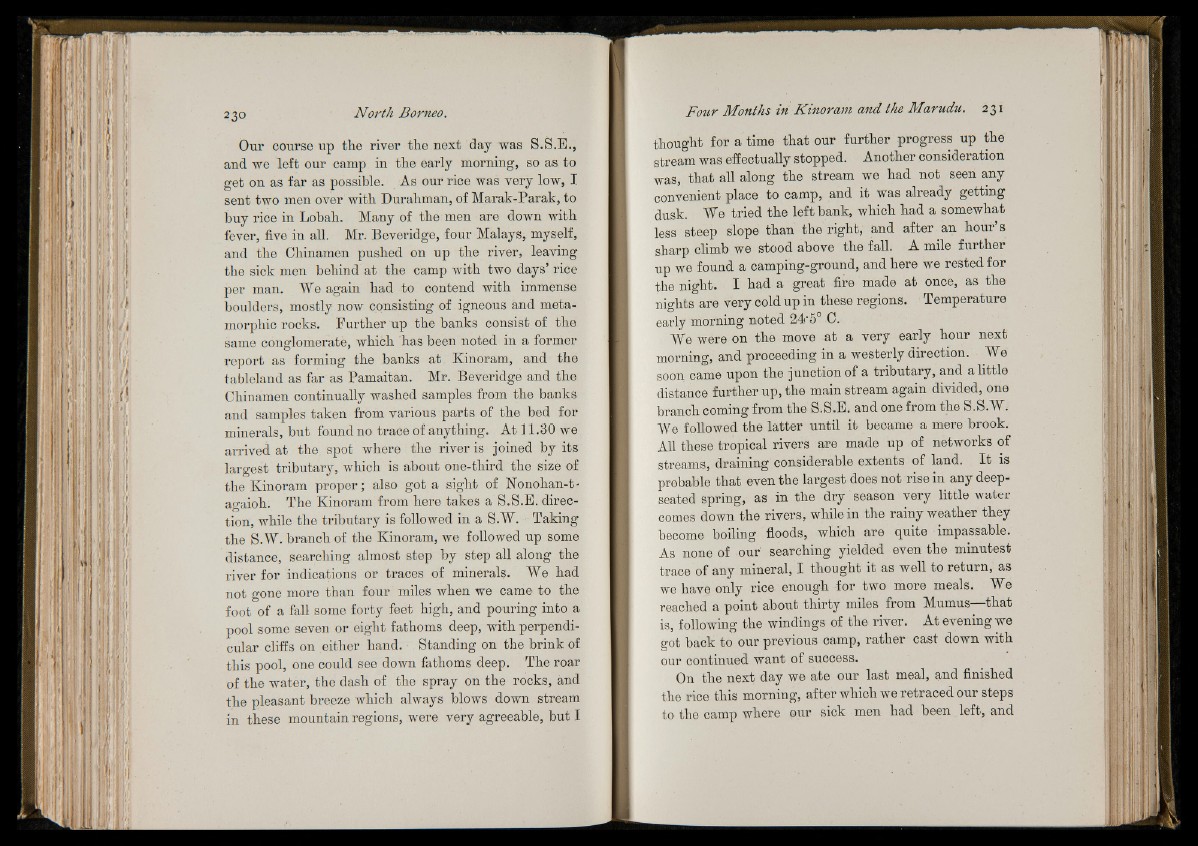
Our course up the river the next day was S.S.E.,
and we left our camp in the early morning, so as to
get on as far as possible. As our rice was very low, I
sent two men over with Durahman, of Marak-Parak, to
buy rice in Lobah. Many of the men are down with
fever, five in all. Mr. Beveridge, four Malays, myself,
and the Chinamen pushed on up the river, leaving
the sick men behind at the camp with two days’ rice
per man. We again had to contend with immense
boulders, mostly now consisting of igneous and meta-
morphic rocks. Further up the banks consist of the
same conglomerate, which has been noted in a former
report as forming the banks at Kinoram, and the
tableland as far as Pamaitan. Mr. Beveridge and the
Chinamen continually washed samples from the banks
and samples taken from various parts of the bed for
minerals, but found no trace of anything. At 11.30 we
arrived at the spot where the river is joined by its
largest tributary, which is about one-third the size of
the Kinoram proper; also got a sight of Nonohan-t-
atraioh. The Kinoram from here takes O I a S.S.E. dirIection,
while the tributary is followed in a S.W. Taking
the S.W. branch of the Kinoram, we followed up some
distance, searching almost step by step all along the
river for indications or traces of minerals. We had
not gone more than four miles when we came to the
foot of a fall some forty feet high, and pouring into a
pool some seven or eight fathoms deep, with perpendicular
cliffs on either hand. Standing on the brink of
this pool, one could see down fathoms deep. The roar
of the water, the dash of the spray on the rocks, and
the pleasant breeze which always blows down stream
in these mountain regions, were very agreeable, but I
thought for a time that our further progress up the
stream was effectually stopped. Another consideration
was, that all along the stream we had not seen any
convenient place to camp, and it was already getting
dusk. We tried the left bank, which had a somewhat
less steep slope than the right, and after an hour’s
sharp climb we stood above the fall. A mile further
up we found a camping-ground, and here we rested for
the night. I had a great fire made at once, as the
nights are very cold up in these regions. Temperature
early morning noted 24'5° C.
We were on the move at a very early hour next
morning, and proceeding in a westerly direction. We
soon came upon the junction of a tributary, and a little
distance further up, the main stream again divided, one
branch coming from the S.S.E. and one from the S.S.W.
We followed the latter until it became a mere brook.
All these tropical rivers are made up of networks of
streams, draining considerable extents of land. I t is
probable that even the largest does not rise in any deep-
seated spring, as in the dry season very little water
comes down the rivers, while in the rainy weather they
become boiling floods, which are cpnte impassable.
As none of our' searching yielded even the minutest
trace of any mineral, I thought it as well to return, as
we have only rice enough for two more meals. W e
reached a point about thirty miles from Mumus—that
is, following the windings of the river. At evening we
got back to our previous camp, rather cast down with
eur continued want of success.
On the next day we ate our last meal, and finished
the rice this morning, after which we retraced our steps
to the camp where pur sick men had been left, and